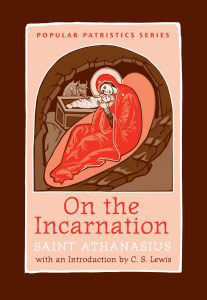Take Up and Read: On the Incarnation
This blog series on Reflections is intended to encourage Christians to read more vigorously by providing a beginner’s guide to some of the Christian classics in such fields as theology, philosophy, and apologetics. Hopefully, a very brief introduction to these important Christian texts will motivate today’s believers, as St. Augustine was called to in his dramatic conversion to Christianity, to “take up and read” (Latin: Tolle lege) these classic books.

Why Is This Author Notable?
Athanasius (ca. 296–373) is one of the most respected persons in church history. His articulation and defense of essential Christian doctrine (primarily Christology) earned him the title “Father of Orthodoxy.” All three branches of Christendom—Orthodox, Catholic, and Protestant—admire him. With his rare combination of a tenacious character and depth of theological insight, St. Athanasius championed Christian doctrine at a time when the faith was extremely vulnerable to heretical attack. For more about him and his accomplishments, see my article “Christian Thinkers 101: A Crash Course on St Athanasius.”
What Is This Book About?
As the title indicates, Athanasius’s book provides an explanation and defense of the historic Christian doctrine of the incarnation in the context of heretical attacks against it. Athanasius affirms that the essence of Christianity is found in the historic truth-claim of Jesus Christ being God in human flesh (a single person with both a divine and a human nature). However, during Athanasius’s lifetime, the incarnation would be directly challenged by the influential Arian heresy. Arius of Alexandria (ca. 256–336) taught that Christ (the Son) was not truly equal to the Father in nature but was rather a created being.
In On the Incarnation, Athanasius argues for the truth of the incarnation and indirectly argues against the Arian heresy by insisting that only the God-man (God in human flesh) can save human beings. Thus, in the atonement, the unique God-man represents and reconciles both parties. So for Athanasius, the truth of the atonement depends upon the prior truth of the incarnation.
Divided into nine chapters, On the Incarnation explains and justifies the incarnation. Moreover, the book addresses humankind’s creation and fall and shows how the incarnation of Jesus Christ distinctly solves man’s predicament. Athanasius also addresses non-Christian challenges to the incarnation that come from both Jewish and Gentile sources.
The following quote is attributed to Athanasius as he reflected upon the truth of the incarnation in light of the Arian heresy:
Why Is This Book Worth Reading?
On the Incarnation is a doctrinal and theological classic. Its central theme that only Jesus Christ the God-man can save lost sinners defines historic Christianity. In reading Athanasius’s work, you discover how this great fourth-century Christian theologian and apologist understands and justifies the faith.
In his introduction to Athanasius’s book, C. S. Lewis writes: “When I first opened his De Incarnatione I soon discovered by a very simple test that I was reading a masterpiece. . . . Only a master mind could, in the fourth century, have written so deeply on such a subject with such classical simplicity.”2
His ability to write about Christianity’s most profound truth with great clarity makes Athanasius’s book one of my doctrinal favorites.
Resources
- I recommend this edition that includes an introduction by C. S. Lewis: St. Athanasius, On the Incarnation: The Treatise de Incarnatione Verbi Dei, rev. ed. (Crestwood, NY: St. Vladimir’s Orthodox Theological Seminary, 1982).
- For more about St. Athanasius and his contributions to historic Christianity, see Gerald R. McDermott, “Athanasius,” chap. 3 in The Great Theologians: A Brief Guide (Downers Grove, IL: InterVarsity, 2010), 30–47.
Endnotes
- B. K. Kuiper, The Church in History, rev. ed. (Grand Rapids: Eerdmans, 1988), 31.
- St. Athanasius, On the Incarnation: The Treatise de Incarnatione Verbi Dei, rev. ed. (Crestwood, NY: St. Vladimir’s Orthodox Theological Seminary, 1982), 9.






